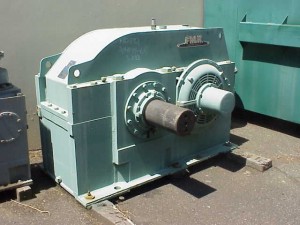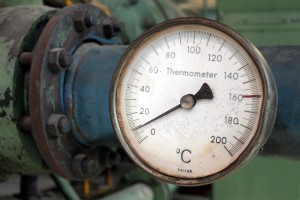 It may come as a surprise to learn that the environment a Falk gearbox operates in is just as integral to the development of a maintenance plan as other aspects, like gear wear and internal temperature. Understanding how the environment, both internal and external, impacts your Falk gearbox parts is essential to the longevity and performance of your gearbox.
It may come as a surprise to learn that the environment a Falk gearbox operates in is just as integral to the development of a maintenance plan as other aspects, like gear wear and internal temperature. Understanding how the environment, both internal and external, impacts your Falk gearbox parts is essential to the longevity and performance of your gearbox.
External Temperature Effects on Falk Gearbox Performance
Across the country, seasonal changes in temperatures can sometimes be extreme. These environmental temperature fluctuations can have a huge impact on the operation of your Falk gearbox. Proper maintenance and the right oil can make the difference.
You may have to choose different oil grades throughout the year to ensure that your gearbox is running smoothly, no matter the environmental temperature. Hot days make the oil run thin, and cold days make the oil run thick. Extreme weather puts the working condition of any gearbox at risk. Consider using an oil cooler or heater to maintain the correct operating temperature for your lubricant.
If your Falk gearbox is regularly exposed to harsh conditions, or abrupt changes in temperature, be sure to have the right kind of lubricant on hand so as to avoid gearbox failure and end up spending valuable time and money trying to get the gearbox back into working order.
Choose the Right Lubricant for the Job
Choosing the right lubricant makes all the difference to ensure a Falk gearbox runs efficiently in any environment. An important factor in choosing the right oil is its viscosity under different conditions. The viscosity “must be capable of providing adequate oil film to support gear-tooth and bearing loads under all operating conditions.”
This means the viscosity, or the measure of a fluid’s resistance to gradual deformation by stress, be such that it can lubricate the gearbox parts in any temperature. Choose a lubricant that can distribute the right amount of oil to where it is needed during the gearbox’s operation. Cold temperatures can affect the viscosity of the oil, rendering it incapable of reaching critical surfaces.
Improper lubrication and contamination account for about a quarter of gearbox failures. Failing to use the right kind of lubricant, failing to monitor lubricant contamination, and not enough lubrication are all root causes of breakdowns in equipment. Check your feed lines, as even small leaks can cause huge problems. Even the slightest decrease of lubrication can mean the gearbox is liable to fail, and possibly require costly repairs.
Consider the Oil Characteristics
There are a number of variables you must consider when choosing an oil, from its specific application to temperature differentials. Take a look at the temperature index. If it’s flatter then, as the oil temperature rises, the viscosity will decrease at “lesser rate than comparable fluids.” Synthetic oils often have a flatter temperature index than other mineral-based oils. This means that “even at lower temperatures, synthetic oil will be less viscous than its counterparts.”
Internal Temperature Effects on Falk Gearboxes
 The temperature inside your Falk gearbox is just as important as the external temperature. Temperature fluctuations can have a dramatic impact on the viscosity of your lubricant; if the internal temperature is erratic and has frequent spikes, then it should be filtered or changed to promote better quality operations.
The temperature inside your Falk gearbox is just as important as the external temperature. Temperature fluctuations can have a dramatic impact on the viscosity of your lubricant; if the internal temperature is erratic and has frequent spikes, then it should be filtered or changed to promote better quality operations.
Take regular, standardized temperature readings so you can keep a close eye on your gearbox operation. These tests will help you determine if further examination is required. Sometimes it just needs a minor adjustment, but it may be symptomatic of a larger problem, such as deterioration of the parts.
Gearboxes run at higher temperatures than other machinery, and this can cause the oils to break down into their component parts, thus losing their lubricating capacity. The deterioration causes separation in the mix. Different combinations of carbon, hydrogen, and oxygen can create grit, which forms a thick sludge. This sludge can cause metal-to-metal contact – a common cause of gearbox failure.
In need of Falk gearbox repair or renewal? Contact the experts at Mar-Dustrial. We’ve been the go-to Falk specialists since 1947, proudly serving the wind and power, agricultural, mining industries, and more.
Posted under Falk Gearboxes on Wednesday, March 20th, 2019
